A Systematic Literature Review (SLR) is a type of research method used in the field of academia to gather, analyse, and synthesise a large body of literature on a specific topic. Consequently, the goal of an SLR is to present a thorough, thorough, and current review of the current status of research on a specific topic. Additionally, the SLR process entails formulating a research topic, creating a systematic search strategy, and using defined criteria to critically assess the calibre and applicability of the studies identified. Thus, gaps in the existing literature, trends, and conclusions concerning the subject of the inquiry are all determined by the results of the systematic literature review.
Moreover, the SLR is considered a rigorous and transparent method for synthesising evidence. Also, it is often used to inform policy or practice. Additionally, students often get stuck while using this research method. Thus, this guide will help you comprehend SLR better.
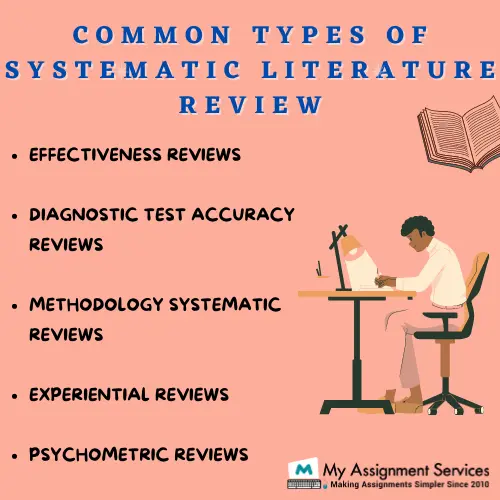
Online Assignment Help
Custom Essay Help
Dissertation Writing Guidance
Some advantages of a systematic literature review are:
SLRs start with a straightforward, concise research question that guides the entire review process.
SLRs use a comprehensive and rigorous search strategy to identify relevant studies. This includes using multiple databases, keywords, and other sources to ensure that all relevant literature is included. Additionally, students often need help understanding the formatting of an SLR. Thus, they seek assistance with our experts' systematic literature review methodology section.
SLRs define explicit inclusion and exclusion criteria for studies. Thus this ensures that only high-quality, relevant studies are included in the review.
Systematic literature review critically evaluates the standard of the studies incorporated in the review, often using standardised quality assessment tools.
In order to present a thorough overview of the current state of research on the subject, SLRs pull pertinent data from the papers included in the review and synthesise the findings.
The systematic literature review presents the review results clearly and concisely, often using tables, figures, and narrative summaries to highlight key findings.
SLRs critically appraise the studies included in the review, considering factors such as sample size, study design and potential sources of bias.
Some of the disadvantages of an SLR are:
A systematic literature review is time-consuming, requiring a thorough search of multiple databases and a critical appraisal of the identified studies.
SLR is resource-intensive, requiring specialised skills, access to databases and resources, and significant time and effort to complete.
A systematic literature review can be challenging in identifying all relevant studies, mainly if the research question is broad or there is a large volume of literature available.
SLR is a prescriptive process that can limit the flexibility and creativity of the researcher in exploring the literature and identifying new insights.
Overall, a Systematic literature review is a rigorous and transparent method for reviewing the literature, but it also requires significant time and resources to complete. Thus, it is a practical approach for synthesising existing research and providing a comprehensive understanding of the state of research on a specific topic.
There are multiple types of systematic literature reviews. Now, let’s look at the most common ones below -
This type of SLR precisely assesses the effectiveness of interventions, treatments, or programs in a particular field of study. Thus, they aim to recognise the pros and cons of the available evidence. This includes the impact of the intervention on a specific outcome and determining the level of evidence for the effectiveness of the intervention.
This refers to the systematic evaluation and assessment of the performance of diagnostic tests. These reviews typically involve the analysis of multiple studies conducted to assess the reliability of a specific diagnostic test. Furthermore, the accuracy of a diagnostic test is a measure of its potential to correctly recognise individuals with a specific condition or disease.
A systematic literature review methodology can be conducted to examine any methodological problems with the planning, execution, or analysis of research investigations.
Experiential (qualitative) reviews are subjective evaluations of products or services. This is based on personal experiences and feelings rather than quantitative measurements or objective facts. Additionally, they are often written by customers or users who have used the product or service and aim to provide a detailed, in-depth description of what it is like to use the product and how it performs.
Psychometric reviews refer to the scientific evaluation of psychological tests and assessments. These tests and assessments measure a person's abilities, aptitudes, skills, personality, and other psychological traits. Thus, a psychometric review is an in-depth analysis of the properties of a test, such as its reliability, validity, and fairness.
PRISMA is a collection of instructions and a checklist that offers a uniform and open method of publishing systematic reviews and meta-analyses. The PRISMA systematic review standards also seek to enhance the quality and completeness of reporting systematic reviews and meta-analyses, enabling readers to evaluate the approaches and outcomes of these investigations critically.
The PRISMA directory consists of 27 items that cover different aspects of a systematic review. This includes study questions, inclusion and exclusion criteria, search strategies, data extraction and synthesis, study selection, risk of bias assessment, and dissemination of findings. Thus, by following the PRISMA systematic review guidelines and using the PRISMA checklist, authors can ensure that their systematic review provides a comprehensive and transparent description of the methods and results, which can enhance the validity and reliability of their findings.
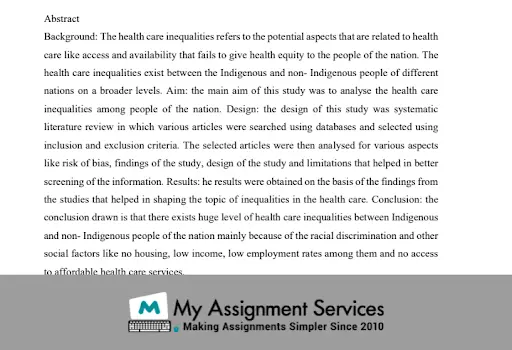
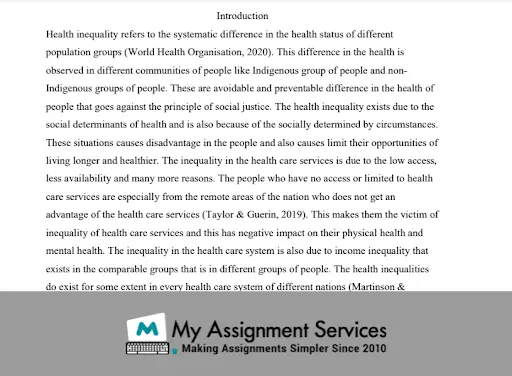
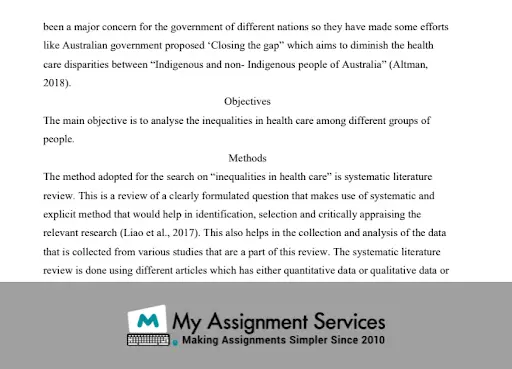
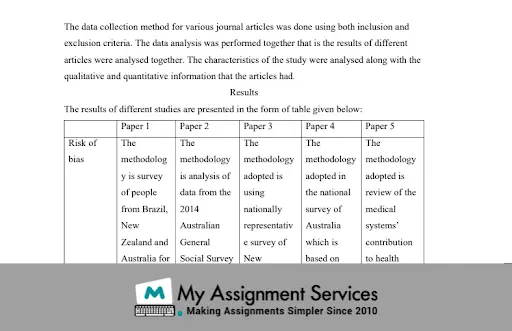
24 X 7 Support
100+ Subjects Covered
2000+ Ph.D Experts
The features of My Assignment Services are as follows -
The assignment writers we employ hold PhDs and have years of experience helping students with their academic work online. Thus, you can vouch for the fact that they have vast topic knowledge, good research abilities, and the capacity to produce excellent systematic literature reviews.
Do you have the deadline approaching? Take our dissertation literature review help and stop letting the deadlines haunt you. Our experts understand how critical timely submissions are for your academics and for you to assess the completed work. Thus, they complete the assignment and send it to you before the due date.
You may receive assignment assistance from us. However, this does not imply that we use shortcuts or provide subpar work for you. We guarantee that the work you submit will earn you high marks. Thus, it will be flawlessly written in compliance with all institutional requirements.
Do you have any urgent concerns that you would like us to address? Do you wish to place your order at the crack of dawn? Don't hesitate for a second; get in touch with our dissertation literature review help professionals whenever suits you. Therefore, they are there to help you whenever you need them.
Additionally, are you looking for an expert to assist you with a systematic literature review? Therefore, avail of our services and access the best samples created by our experts to get the highest grades possible.
1,212,718Orders
4.9/5Rating
5,063Experts
Turnitin Report
$10.00Proofreading and Editing
$9.00Per PageConsultation with Expert
$35.00Per HourLive Session 1-on-1
$40.00Per 30 min.Quality Check
$25.00Total
FreeGet
500 Words Free
on your assignment today
Request Callback
Doing your Assignment with our resources is simple, take Expert assistance to ensure HD Grades. Here you Go....
Lock in your expert now.
Pay the rest only after you're 100% satisfied.
Why this is a no-brainer:
